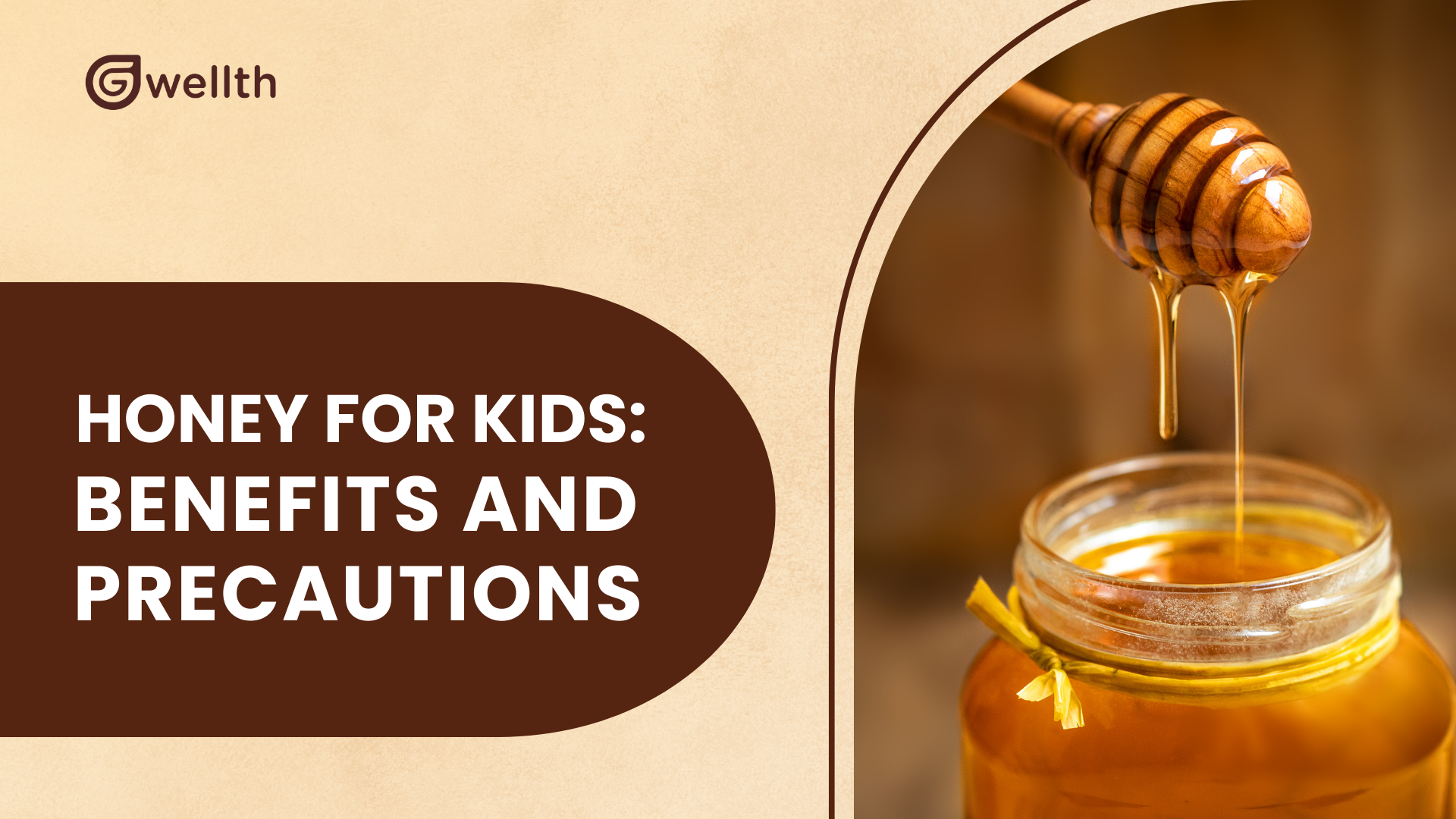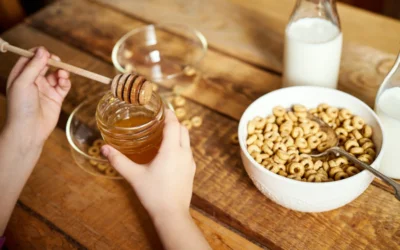HONEY FOR KIDS: BENEFITS AND PRECAUTIONS.

Bees use floral nectar to make honey, a naturally sweet delicacy. When natural honey is unprocessed and unadulterated, it is frequently referred to as pure honey. In addition to being delicious, natural honey has numerous health advantages. It can give you energy, relieve sore throats, and even function as a mild natural antibiotic. Natural honey has several health benefits, such as enhancing digestion, boosting immunity, and supplying your body with beneficial vitamins and minerals. But it’s crucial to keep in mind that honey can occasionally result in botulism, a rare but dangerous illness; therefore it shouldn’t be given to infants less than a year old. Be cautious to use pure honey from a reliable supplier at all times!
Is Honey Beneficial For Your Children?
Indeed! Despite its seemingly sugary nature, this golden substance is rich in numerous healthy and advantageous properties for developing children.
Honey derives its sweetness from the diligent efforts of pollinating bees. This natural sweetener has been utilized by ancient cultures in Egypt, Greece, Rome, India, and beyond for its therapeutic qualities. The ancient knowledge of honey’s medicinal benefits is now widely recognized; let your family benefit from it too.
However, it is crucial to note that honey should not be given to children under the age of one, and it is generally advised not to give honey to children under two years old. Honey contains bacteria that can lead to infant botulism, a severe form of food poisoning that can be fatal. Additionally, there is a potential risk of developing pollen allergies from honey. While these concerns are significant, once your child reaches the age of two or more, the numerous health benefits of natural honey make it a valuable addition to their daily diet.
Whenever feasible, choose certified organic honey over local or commercial varieties. Local honey poses a higher risk of pollen allergies, while commercial honey often contains pesticides and other chemicals. Always check the label to ensure that the ingredients in your honey are suitable for your child.
After selecting organic honey, you can begin incorporating it as a sweetener in tea or adding it to your favorite recipes for a delightful flavor enhancement (in moderation, of course!).
What Are The Health Benefits Of Natural Honey For Children?
1. It provides children sustained energy:
Honey consists mainly of three types of sugars: sucrose, glucose, and fructose. Each sugar is metabolized differently by the body—sucrose and glucose are rapidly digested, leading to a quick increase in blood sugar levels. In contrast, fructose remains in the system longer, offering children a consistent source of energy. This results in alertness without the hyperactivity often associated with other sugary snacks.
2. It is rich in essential vitamins and minerals.
It is abundant in essential vitamins and minerals that support the growth of children. Additionally, natural honey includes amino acids that are vital for their development.
3. It protects from liver damage:
Honey serves as a protective barrier for the liver against various diseases and potential damage. Research indicates that it can mitigate the adverse effects of paracetamol, a common pain reliever that can harm the liver. If your child is unwell, a spoonful of honey can facilitate the intake of medication while offering protective benefits.
4. It accelerates wound healing:
Surprisingly, applying honey to minor cuts and scrapes can promote faster healing. Recent studies have demonstrated that honey has significant healing properties compared to untreated wounds. It not only speeds up the healing process but also helps to soothe irritated skin.
5. It alleviates coughs:
Scientific research supports this traditional remedy. Honey acts as a soothing agent for a child’s sore throat, effectively reducing coughing. A spoonful of honey can also assist if your child experiences difficulty swallowing due to throat irritation.
6. Promotes Healthy Skin:
When utilized in skincare formulations or applied directly, honey’s antibacterial and hydrating qualities contribute to maintaining your child’s skin in a healthy, moisturized state, free from imperfections and blemishes.
7. Supports Weight Management:
Although honey is sweet, it can aid in weight management when consumed in moderation. Its natural sugars are absorbed more gradually than those found in refined sugars, which helps stabilize blood sugar levels and curtail cravings for unhealthy snacks.
8. Enhances Immunity:
Rich in antioxidants, vitamins, and minerals, honey can bolster your child’s immune system, increasing their resistance to infections and illnesses.
9. Calms down toothache:
A mixture of honey and a touch of cinnamon serves as an effective remedy for toothaches. By combining one teaspoon of cinnamon with teaspoons of honey to create a paste, you can apply it directly to the affected area, providing significant pain relief for a troublesome toothache.
Honey, while inherently sweet, offers numerous health benefits that can significantly enhance your child’s well-being. Incorporating honey into their diet not only promotes better health but also improves their overall mood. With a variety of honey-infused recipes, your family is sure to enjoy delightful meals.
Where Can You Purchase High-Quality Natural Honey?
When selecting honey for your child, it is essential to prioritize quality. Whenever feasible, choose raw, unprocessed pure honey, as it preserves a greater amount of its natural nutrients and beneficial properties compared to processed options. Visit Gwellth Foods and Beverages; we deliver the benefits of natural honey in its purest form.
Is It Safe for Our Children to Consume Honey Daily?
Indeed, children can include pure honey in their daily diet as part of a well-rounded nutrition plan. However, it is important to consume it in moderation, as honey is a source of natural sugars, and excessive intake may lead to increased calorie consumption and potential dental problems.
Here are several suggestions for incorporating natural honey into a healthy daily routine:
1. Drizzle on Breakfast Food Items:
Enhance breakfast items such as oatmeal, yogurt, or whole-grain cereal with a drizzle of honey for a natural sweetness.
2. Spread on Whole-Grain Toast or Pancakes:
Use honey as a topping for whole-grain toast, waffles, or pancakes in place of processed jams or syrups.
3. Blend into Smoothies:
Incorporate honey into smoothies with fruits, vegetables, and other nutritious ingredients to enhance sweetness and flavor.
4. Use in Baking:
Substitute honey for some or all of the sugar in baking recipes like cookies, muffins, and cakes, serving as a natural sweetener.
5. Serve as a Dip for Fruits:
Offer honey as a dip for fresh fruits such as apples, strawberries, or bananas, creating a delicious and nutritious snack.
6. Mix with Nut Butters:
Blend honey with nut butter such as peanut butter or almond butter to make a sweet and creamy spread suitable for sandwiches or fruit slices.
7. Blend with Dairy Products:
Combine honey with Greek yogurt, cottage cheese, or ricotta cheese to create a sweet and creamy snack or dessert.
8. Use in Salad Dressings:
Create a flavorful homemade salad dressing by mixing honey with olive oil, vinegar, and herbs.
9. Sweeten drinks:
Add honey to warm drinks such as tea or milk for a comforting and naturally sweetened beverage.
10. Include in Homemade Treats:
Get inventive by adding honey to homemade treats like energy bars or fruit popsicles for a healthier alternative.
Incorporating honey into your child’s nutrition can yield numerous health advantages, including enhancing their immune function and fostering overall health. By selecting premium honey and integrating it into their daily meals and snacks, you can enable your child to enjoy the goodness of natural sweetness and the nutritional benefits of this remarkable superfood.
CONCLUSION:
Natural honey serves as an excellent and healthful addition to your children’s diet, providing various benefits such as strengthening immunity and delivering natural energy. When utilized appropriately, pure honey can be a nutritious substitute for sugary snacks. However, it is crucial to use it safely, particularly for younger children, and always choose high-quality, unprocessed honey. With these considerations in mind, honey can be a delightful and advantageous treat for your entire family.
FAQs
Question 1. What advantages does Natural honey offer for children?
Answer: Enhances Immune Function: Honey possesses natural antibacterial qualities that contribute to a stronger immune system.
Alleviates Cough and Throat Discomfort: It can relieve throat irritation and diminish coughing, especially in children older than one year.
Supplies Energy: Honey is rich in natural sugars such as glucose and fructose, providing a rapid source of energy.
Supports Digestive Health: Honey functions as a prebiotic, fostering the growth of beneficial gut bacteria.
Nutrient-Dense: It is abundant in vitamins, minerals, and antioxidants that can enhance overall well-being.
Question 2. Is natural honey appropriate for all children?
Answer: Natural honey is suitable for children aged over one year. For infants under 12 months, it may pose a risk of botulism due to the presence of bacterial spores in honey.
Question 3. What quantity of pure honey is safe for children?
Answer: A small amount (approximately 1 teaspoon) per day is typically safe for most children, depending on their age and nutritional requirements. It is advisable to maintain a moderate amount due to the high sugar content.
Question 4. Can natural honey assist with digestion?
Answer: Indeed, natural honey has prebiotic properties that can promote the growth of beneficial bacteria in the digestive tract, thereby aiding digestion.

